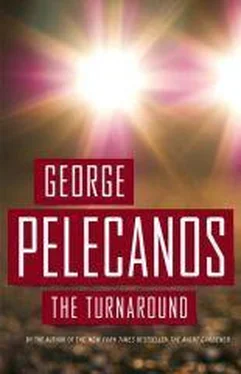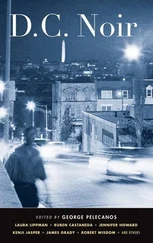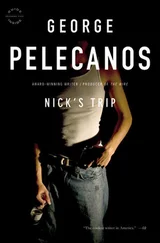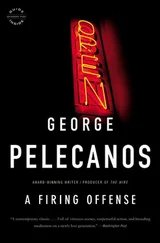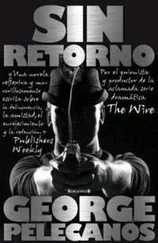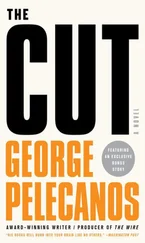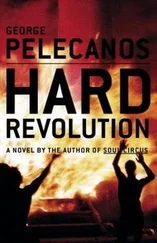George Pelecanos - The Turnaround
Здесь есть возможность читать онлайн «George Pelecanos - The Turnaround» весь текст электронной книги совершенно бесплатно (целиком полную версию без сокращений). В некоторых случаях можно слушать аудио, скачать через торрент в формате fb2 и присутствует краткое содержание. Жанр: Криминальный детектив, на английском языке. Описание произведения, (предисловие) а так же отзывы посетителей доступны на портале библиотеки ЛибКат.
- Название:The Turnaround
- Автор:
- Жанр:
- Год:неизвестен
- ISBN:нет данных
- Рейтинг книги:3 / 5. Голосов: 1
-
Избранное:Добавить в избранное
- Отзывы:
-
Ваша оценка:
- 60
- 1
- 2
- 3
- 4
- 5
The Turnaround: краткое содержание, описание и аннотация
Предлагаем к чтению аннотацию, описание, краткое содержание или предисловие (зависит от того, что написал сам автор книги «The Turnaround»). Если вы не нашли необходимую информацию о книге — напишите в комментариях, мы постараемся отыскать её.
The Turnaround — читать онлайн бесплатно полную книгу (весь текст) целиком
Ниже представлен текст книги, разбитый по страницам. Система сохранения места последней прочитанной страницы, позволяет с удобством читать онлайн бесплатно книгу «The Turnaround», без необходимости каждый раз заново искать на чём Вы остановились. Поставьте закладку, и сможете в любой момент перейти на страницу, на которой закончили чтение.
Интервал:
Закладка:
“You want somethin to eat, don’t you?”
“Yes.”
“Go on down and talk to your father,” she said, with a head motion to the register area. “I’ll fix you something nice.”
“Thanks.”
“I get hungry, too.” Darlene chuckled. “And I would just…”
Alex blushed and, unable to speak, moved along. He passed Inez, who was bagging up a rack of delivery orders, preparing to move them over to “the shelf,” where Alex would get his marching orders. Inez did not greet him.
Farther down the line, he said hello to Paulette, the counter girl who served the in-house customers. She was twenty-five, heavy everywhere, large featured, and very religious. After lunch she commandeered the radio for the gospel hour, which everyone endured, since she was so sweet. With her high-pitched, soft-as-mouse-steps voice, she was nearly invisible in the store.
Paulette was filling the Heinz ketchup bottles with Townhouse ketchup, the inexpensive house brand from Safeway. Alex’s father shopped at the Safeway every night for certain items that were cheaper than the offerings from the food brokers.
“Morning, Mr. Alex,” she said.
“Morning, Miss Paulette.”
Alex met his father down by the register. Only John Pappas and his son rang on the machine. A D.C. tax schedule was fixed to the front of it, beside two keys rowed by dollars and cents. If the tab hit twenty dollars, which it rarely did, the ten-dollar key would be punched twice. On the sides of the register were Scotch-taped pieces of paper on which Alex had handwritten bits of song lyrics that he found poetic or profound. One of the customers, a pipe-smoking attorney with a fat ass and an overbite, assumed that Alex had written the lyrics himself, and jokingly told John Pappas that as a writer, his son “made a good counterman.” Pappas replied, with a smile that was not a smile, “You don’t need to worry about my boy. He’s gonna do fine.” Alex would always remember his father for that, and love him for it.
John handed his son some ones and fives. He pushed rolls of quarters, dimes, nickels, and pennies along the Formica.
“Here’s your bank, Alexander. You’ve got a couple of early orders.”
“I’m ready. First I’m gonna grab a bite to eat.”
“When those orders hit the shelf, I want you outta here. I don’t want you to get behind.”
“Darlene’s makin me a sandwich.”
“Quit screwin around.”
“Huh?”
“I got eyes. I told you before: don’t get too familiar with the help.”
“I was just talking to her.”
“Do what I tell you.” John Pappas looked toward the shelf over the dishwashing unit, where Junior was pulling down a drop hose with a power nozzle, preparing to hand-clean a pot. Inez was nudging him aside, placing a couple of tagged brown paper bags on the shelf. “You got orders up.”
“Can’t I eat first?”
“Eat while you’re walkin.”
“But Dad -”
John Pappas jerked his thumb toward the back of the store. “Get on your horse, boy.”
Alex Pappas wolfed down a BLT back by Junior’s station, then grabbed two bags off the shelf. A light green guest check was stapled to the front of each. On the top line was written, in Inez’s florid, lucid script, the delivery address. Below was the detailed order, itemed out, with prices, taxes, and grand total circled. Alex liked to guess the tax based on the subtotal. It wasn’t easy, as the D.C. tax was always a percentage and a fraction, never a whole number. But he had figured out a way to do it by stages of multiplication and addition. He had struggled all his life with school math, but he had taught himself percentages by working the register.
Working here was more beneficial than school in many respects. He learned practical math. He learned how to get along with adults. He met people he would otherwise never have met. Most important was what he learned from watching his father. Work was what men did. Not gambling or freeloading or screwing off. Work.
Alex took the back door to a hallway that held a utility closet and a janitor’s bathroom that the help used (he and his father used the bathrooms in the office building above them). He went up a short flight of stairs to the back exit and stepped out into an alley. The alley was fashioned as a T and had three outs: N Street to the north, Jefferson Place to the south, and 19th Street to the west. Alex’s first stop was the Brown Building, a boxy structure so called because of its color, housing government workers, at 1220 19th.
The money was good. It was better than any buck-sixty-an-hour minimum-wage thing he could have gotten on his own. His father paid him fifteen dollars a day. He cleared another fifteen, twenty in tips. As he did with the other employees, his father paid him weekly in a small brown envelope, in cash. Alex paid no taxes. Unlike his friends, he had walking-around dollars in his pocket all the time.
After all these summers, he knew every alley, every crack in the sidewalk in the blocks south of Dupont. He had been working as a delivery boy for his father for six summers. He had started when he was eleven. His father had insisted on it, though Alex’s mother felt he was too young. He had surprised himself when he found that after a few shaky days, he could do the work. His father was never easy on him. When he came up short on cash a couple of times in the first few weeks, his father took the shortfall out of his pay. Alex was mindful after that to carefully count out the customer’s change.
At eleven he had been a typical head-in-the-clouds kid. He was distracted easily, stopped to look in store windows on the Avenue, and often fell behind. He was naive to the ways of the city and its predators. That first summer, as he made a delivery up by the Circle, an older man had pinched him on the ass, and when Alex turned around to see who had done this thing to him, the man winked. Alex was perplexed, thinking, Why did that man touch me like that? But he knew enough not to tell his father about the incident when he returned to the store. His father would have found the man out on the street and, Alex was certain, beaten him half to death.
Many major law firms were situated around the shop. Arnold and Porter, Steptoe and Johnson, and others. Alex didn’t like the way some of the attorneys, men and women alike, talked down to his father. Didn’t they know he was a marine and a veteran? Didn’t they know he could kick their soft asses around the block? Some of them clearly thought they were better than his father, which placed a longtime blue-collar chip on Alex’s shoulder. But just as many were kind. Often they nursed coffees at the counter just as an excuse to talk to his old man. John Pappas was more than quiet; he was a good listener.
These law firms needed secretaries and mail room eccentrics to make them run, and Alex grew friendly with the girls and the oddballs, bearded guys wearing shorts and Transformer T-shirts, along with the garage attendants who watched their employers’ cars. On Jefferson Place, a narrow street of residential row homes converted to commercial, were smaller firms and associations that took on causes like Native American rights and higher wages for grape pickers. Fancy hippies, his dad called them. But they were not like the hippies, those few who remained, up at the Circle. These people wore shirts and ties. And the women who worked on this street seemed to be on equal footing with the men. Braless with short skirts, but still.
In the earlier years, Alex had been in his own dreamlike state, but as his hormones kicked in, he began to notice the young workingwomen, just about the time that rock and roll and soul music began to mean something to him. He knew elementally that all of it was connected in some way. He would sing the songs he heard on the soul stations while walking his deliveries, and sometimes would sing them in empty elevators, learning through experimentation which ones had the best acoustics. “Groove Me.” “In the Rain.” “Oh Girl.” And he plotted his routes so he would spot particular young women he liked, knowing just where they might be at certain times of day. Most of them thought of him as a kid, but sometimes he would smile at them and get a smile in return that implied something else: You are young but you have something. Be patient, Alex. This will come to you. You are not that far away.
Читать дальшеИнтервал:
Закладка:
Похожие книги на «The Turnaround»
Представляем Вашему вниманию похожие книги на «The Turnaround» списком для выбора. Мы отобрали схожую по названию и смыслу литературу в надежде предоставить читателям больше вариантов отыскать новые, интересные, ещё непрочитанные произведения.
Обсуждение, отзывы о книге «The Turnaround» и просто собственные мнения читателей. Оставьте ваши комментарии, напишите, что Вы думаете о произведении, его смысле или главных героях. Укажите что конкретно понравилось, а что нет, и почему Вы так считаете.
